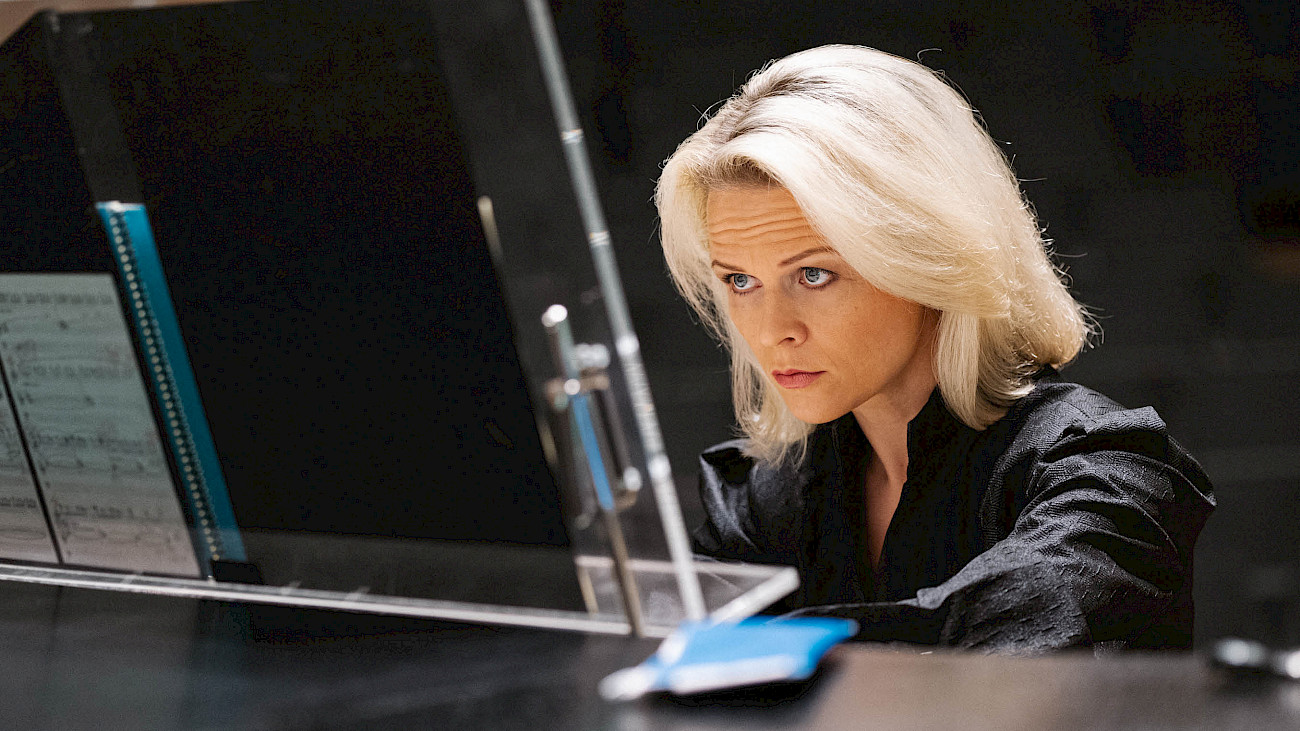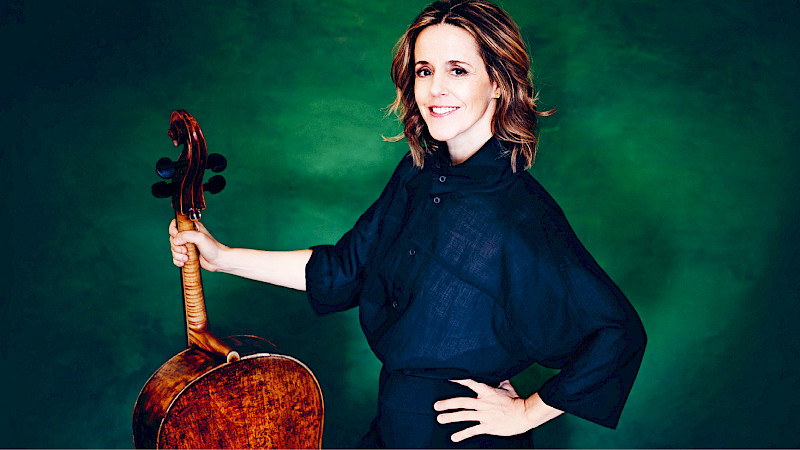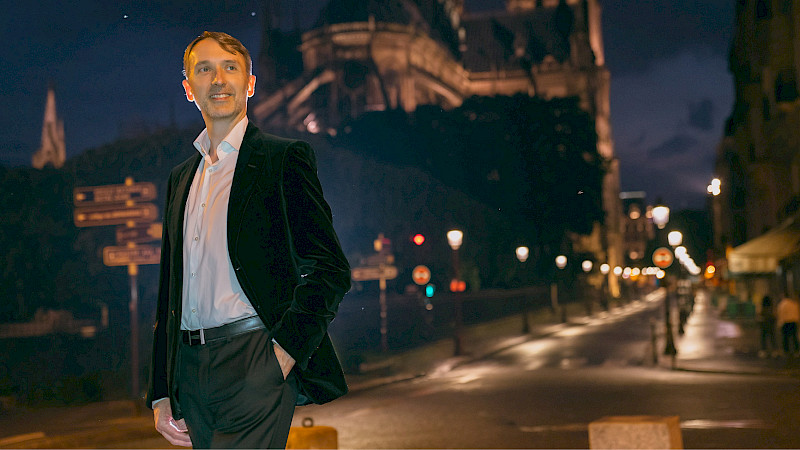
"Posture, posture, posture!"
The exceptional organist Iveta Apkalna is convinced that there is no organ playing without physicality, strength and full physical commitment. She also needs programmes with an "emotional red thread" and good "working shoes" – preferably in silver or gold.
When Iveta Apkalna answers an interview question, her voice takes on a certain drive, emphasis, a small, quite cheerful tremor. And not just when it comes to her instrument, the organ. The passion that has driven her along the way is palpable – whether you are talking to her about the music of Bach or Joseph Jongen, about her favourite instruments in concert halls and churches around the world, about the lucky charms her children have made or about the "Singing Revolution" in her native Latvia.
"When I started to take music seriously – that is, when I had lessons at music school at the age of five – all instruments existed for me. And I could have switched from piano to flute, or cello, or violin. But organ?" That seemed completely impossible to her. She knew about her mother's large record collection and the complete collection of "Historic Latvian Organs". But the reality of her life in Rēzekne, around 250 kilometres south-east of Riga, was different. For Iveta Apkalna, organs were only something "for special moments, only for special people, only for special places. And I wasn't there," she recalls, adding: "Yes, it's a bit painful to hear that coming out of my mouth, but it was something completely incomprehensible to me."
Behind closed doors
Growing up in Soviet Latvia also meant that not every path, not every door was open. Church doors, for example, often remained closed. "We had, and still have, one of the best organs in the world in Riga, in the cathedral. People from all over the Soviet Union and, of course, those of us who lived in Latvia were able to listen to concerts there. After all, the cathedral was used as a concert hall." And yet these opportunities were rare. So rare, in fact, that an image arose in the girl's mind that has stuck with her to this day: "For me, the organ was like a king that I couldn't easily visit or experience. At the same time, from that moment on, I wanted to become an organist."
The closed doors could not stop her – and the melancholy in the conversation quickly faded and gave way to a grateful and powerful tone. After all, Iveta Apkalna is convinced that she was in the right place at the right time: "When I was 15, I was able to experience our 'Singing Revolution' in Latvia, the moment when we became independent. It was not an easy path, Latvia fought for its independence in 1990/91, not without blood. But for me it was also the moment when I started my preliminary studies. All the church doors were suddenly open again." And that's not all the magic: it was at this very moment that Latvia's first organ class was opened, in Rēzekne, Iveta Apkalna's small hometown of all places: "I was literally the first organ student in a newly independent Latvia."
Forget everything
Iveta Apkalna is convinced that she has been very lucky in her life. She has received a lot of support from her family, especially from her mother. And she had wonderful teachers, in Riga, London and Stuttgart, and in both main subjects, piano and organ – which was also a novelty, by the way. Previously, it was not possible to study two instruments simultaneously as a major subject in Riga. Her openness to this kind of experimentation was matched by her performance: "I was always very disciplined and very accurate. I was able to do everything I was told very quickly. Of course, that makes every teacher happy." What fascinates her to this day is how well her teachers were able to assess her – and challenge her accordingly.
One incident stays with her to this day. Her piano teacher in Riga suddenly said to her: "Iveta, forget everything I've just said. Just take a risk!" She no longer understood the world. She had worked so well on the difficult Liszt etude in front of her, everything had to be right, had to fit perfectly. And then this? "Just throw your hand," her teacher continued: "It will land where it needs to land." What was difficult for her to understand at the time worked on her. Little by little, she was able to accept it – and still takes the risk-taking with her on stage at her concerts today.
Almost 180 degrees
For Iveta Apkalna, this intensive stage life as an organist, which demands both mind and body in equal measure, would be inconceivable without a good level of fitness: "Fortunately, I'm a person who likes to move" – and has done so since childhood. Dancing and figure skating have shaped her body awareness, and that was very helpful for playing the organ: "If you imagine that you are sitting down and now you lift both legs and both hands up, where do you have the most tension? In the back and stomach area. And if everything was crooked and lopsided there, then you would not only get physically tired very quickly, but you would soon be in pain. In all areas, including the shoulders, the neck, everywhere. In other words, posture, posture, posture. I am very, very grateful to my dance teacher."
After dancing, she went to the gym for a long time and kept fit with cardio training or Pilates. As she travels so much, she has now developed her own exercise programme: "I don't need much space for it, I just do it in my hotel room." She would also recommend this to other musicians, especially young organists: "Even before one or the other has played a note, I can already guess how it will sound, just from the posture. That may sound like an exaggeration, but it really is very important, especially when playing the organ. Then you can do everything else much more easily and perhaps more quickly. Because we have to be able to turn our centre, abdominal muscles and back flexibly in all directions. Almost 180 degrees. To achieve this, you actually have to do something physically at home."
A second heart and eleven pairs of work shoes
For Iveta Apkalna, "at home" also means "on the road". This is because she spends more nights in hotels each year than in her actual home, with her husband and two children, with whom she lives in Berlin and Riga. That's why she always has a little bit of it with her, in the form of a lucky charm: "A dark red bag that I put on the console with three things in it: a rosary from John Paul II that he gave me, a painted stone from my son and a handmade ring from my daughter. It really is something very special. It's like a second heart that you carry with you." How much the little red travelling companion means to her is not only suggested by the soft tone of voice, but above all by a comparison. What would happen if she lost him? "For me, that would be just like losing or forgetting organ shoes."
Organ shoes! Every organist will probably have their own story on this subject. They should be comfortable and support your playing. Sometimes an accidental find, they are used exclusively for this purpose. For Iveta Apkalna, organ shoes are her "main work" and she has been thinking about them for a long time: "I need the feeling of a skin, so the sole has to be quite thin and sensitive, but at the same time have enough firmness. The toe in particular needs to be firm. And I need a high heel because I often play intervals with one foot where, for example, two or three keys have to be pressed at the same time. That means I have to be able to shape my foot to play intervals." Together with her shoemaker in Latvia, she has developed models that are also eye-catching – "Silver, gold, much rarer in black. Then I also have patent black, white and red shoes. I think I already have nine to eleven pairs."
Department stores' organ and royal chamber music
The shopping centre in Philadelphia/USA, which has gone down in music history as the Wanamaker Department Store because it is home to the largest fully playable organ in the world, certainly offers a lavish selection of shoes. The "Symphonie concertante" by Joseph Jongen was composed for this instrument. For Iveta Apkalna, this enormously powerful and colourful composition is particularly well suited to the organ in the Tonhalle Zurich. Just like her home organ in the Elbphilharmonie in Hamburg, the instrument offers her complete freedom: "Here I can let off steam in all styles."
Accordingly, she wants to show another facet in the Kosmos Kammermusik series with the musicians of the Tonhalle-Orchester Zürich: "The organ can also have a very delicate, filigree part or accompanying voice." In terms of the programme, she is interested in a shared experience: "The titles don't always have to fit together, nor the period, nor the composers' origins. But there has to be this emotional common thread. Latvian music can be heard alongside Bach, Latvia is in my heart." The joint concert with the Latvian State Choir will be a special finale. Because: "No other choir in the world sings the way Latvian choirs do, and I dare to say that. I would like to share this with the Tonhalle audience." And just as the "Singing Revolution" opened the church doors of Latvia to Iveta Apkalna, the organist is now opening the door to her musical world for us.
Translated with DeepL.com





